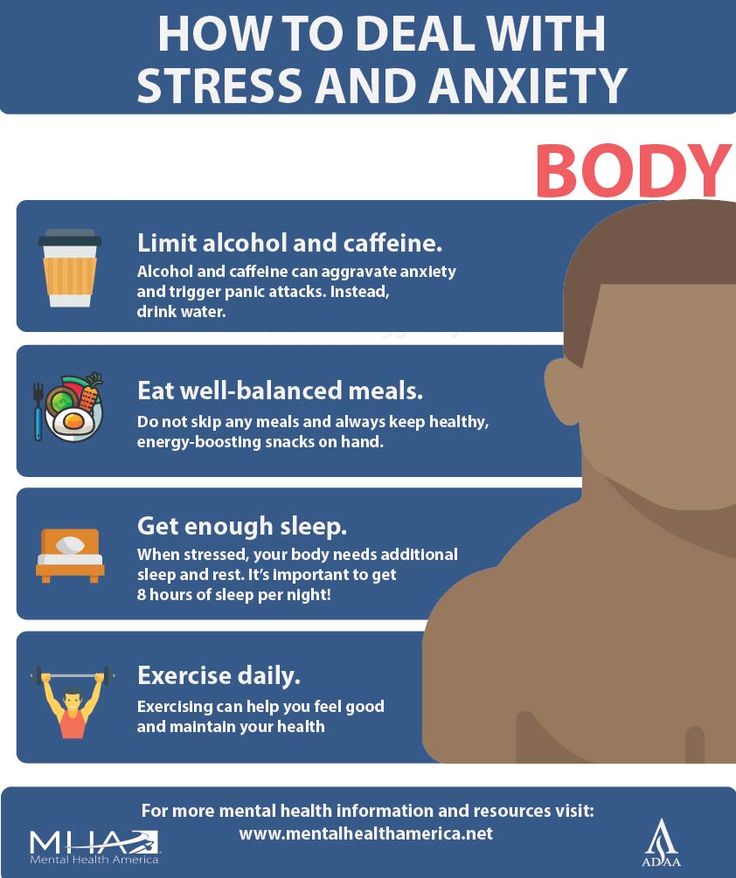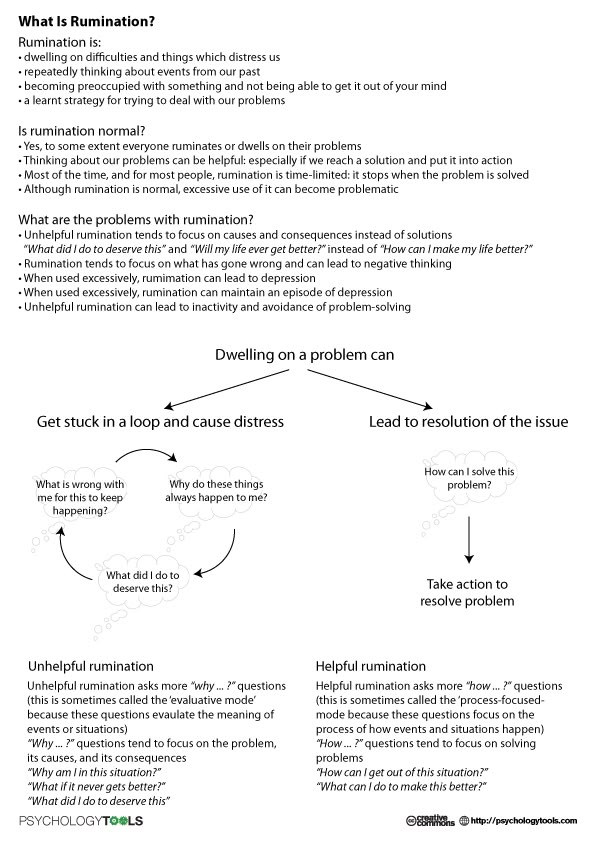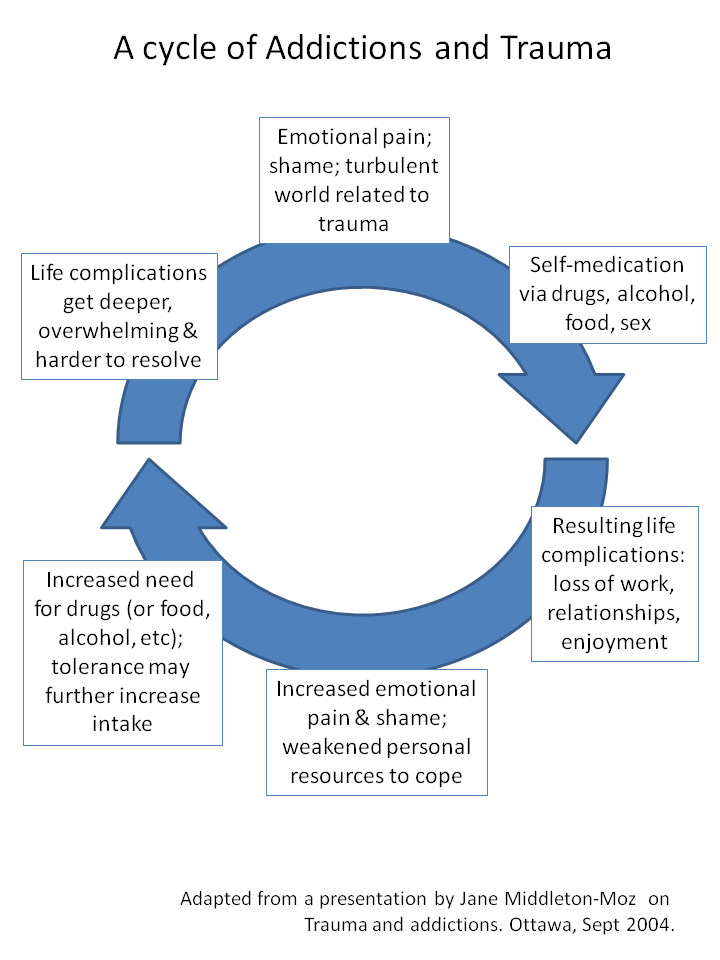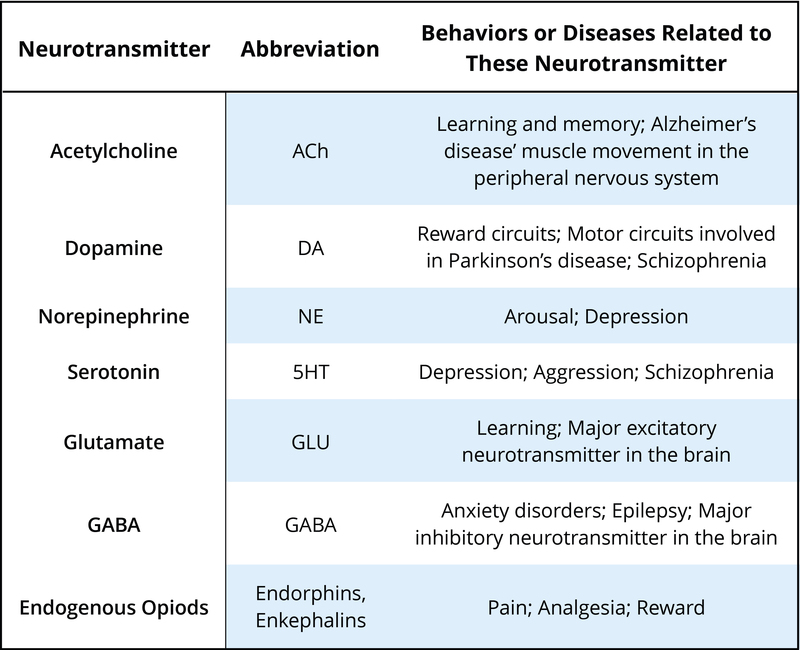Dealing with rumination
10 Tips to Stop Repetitive Thoughts
You can stop repetitive dark thoughts with methods that include distracting yourself or meditating. Lingering in these thoughts may intensify feelings of depression.
Has your head ever been filled with one single thought, or a string of thoughts, that just keep repeating… and repeating… and repeating themselves?
The process of continuously thinking about the same thoughts, which tend to be sad or dark, is called rumination.
A habit of rumination can be dangerous to your mental health, as it can prolong or intensify depression as well as impair your ability to think and process emotions. It may also cause you to feel isolated and can, in reality, push people away.
People ruminate for a variety of reasons. According to the American Psychological Association, some common reasons for rumination include:
- belief that by ruminating, you’ll gain insight into your life or a problem
- having a history of emotional or physical trauma
- facing ongoing stressors that can’t be controlled
Ruminating is also common in people who possess certain personality characteristics, which include perfectionism, neuroticism, and an excessive focus on one’s relationships with others.
You might have a tendency to overvalue your relationships with others so much that you’ll make large personal sacrifices to maintain your relationships, even if they’re not working for you.
Once you get stuck in a ruminating thought cycle, it can be hard to get out of it. If you do enter a cycle of such thoughts, it’s important to stop them as quickly as possible to prevent them from becoming more intense.
As when a ball is rolling downhill, it’s easier to stop the ruminating thoughts when they first start rolling and have less speed than when they’ve gathered speed over time.
So, what can you do to stop these obsessive thoughts from running through your mind?
Here are 10 tips to try when you begin to experience the same thought, or set of thoughts, swirling around your head:
1. Distract yourself
When you realize you’re starting to ruminate, finding a distraction can break your thought cycle. Look around you, quickly choose something else to do, and don’t give it a second thought. Consider:
Consider:
- calling a friend or family member
- doing chores around your house
- watching a movie
- drawing a picture
- reading a book
- walking around your neighborhood
2. Plan to take action
Instead of repeating the same negative thought over and over again, take that thought and make a plan to take action to address it.
In your head, outline each step you need to take to address the problem, or write it down on a piece of paper. Be as specific as possible and also realistic with your expectations.
Doing this will disrupt your rumination. It will also help you move forward in the attempt to get a negative thought out of your head once and for all.
3. Take action
Once you’ve outlined a plan of action to address your ruminating thoughts, take one small step to address the issue. Refer to the plan you made to solve the problem you’ve been obsessing over.
Move forward with each step slowly and incrementally until your mind is put at ease.
4. Question your thoughts
We often ruminate when we think we’ve made a major mistake or when something traumatic has happened to us that we feel responsible for.
If you start ruminating on a troubling thought, try putting your repetitive thought in perspective.
Thinking more about how your troubling thought might not be accurate may help you stop ruminating because you realize the thought makes little sense.
5. Readjust your life’s goals
Perfectionism and unrealistic goal setting can lead to rumination. If you set goals that are unrealistic, you may start to focus on why and how you haven’t reached a goal, or what you should have done to reach it.
Setting more realistic goals that you’re capable of achieving can reduce the risks of overthinking your own actions.
6. Work on enhancing your self-esteem
Many people who ruminate report difficulties with self-esteem. In fact, lack of self-esteem can be associated with increased rumination. It’s also been linked with increased risk of depression.
It’s also been linked with increased risk of depression.
Enhancement of self-esteem can be accomplished in many ways. For instance, building on existing strengths can add to a sense of mastery, which can enhance self-esteem.
Some people may choose to work on the enhancement of self-esteem in psychotherapy. As you enhance your self-esteem, self-efficacy may also be enhanced. You may find that you’re better able to control rumination.
7. Try meditation
Meditating can reduce rumination because it involves clearing your mind to arrive at an emotionally calm state.
When you find yourself with a repeating loop of thoughts in your mind, seek out a quiet space. Sit down, breathe deeply, and focus on nothing but breathing.
8. Understand your triggers
Each time you find yourself ruminating, make a mental note of the situation you’re in. This includes where you are, what time of day it is, who’s around you (if anyone), and what you’ve been doing that day.
Developing ways to avoid or manage these triggers can reduce your rumination.
9. Talk to a friend
Ruminating thoughts can make you feel isolated. Talking about your thoughts with a friend who can offer an outside perspective may help break the cycle.
Be sure to speak with a friend who can give you that perspective rather than ruminate with you.
10. Try therapy
If your ruminating thoughts are taking over your life, you may want to consider therapy. A therapist can help you identify why you’re ruminating and how to address the problems at their core.
Lifestyle changes
If you’re a long-time ruminator who wants to bring an end to your repetitive negative thoughts, here are some simple changes you can make to your life that can help do just that:
- Be proactive in trying to solve your problems. First identify problems in your life and then start taking actions to solve your problems, one step at a time
- Set your own expectations.
 Negative ruminating thoughts can creep in when we question our self-worth. Praise yourself for your successes and forgive yourself for your mistakes. Constantly work on building your self-esteem by taking care of yourself and doing things you enjoy and excel at.
Negative ruminating thoughts can creep in when we question our self-worth. Praise yourself for your successes and forgive yourself for your mistakes. Constantly work on building your self-esteem by taking care of yourself and doing things you enjoy and excel at. - Create a support system. Having friends and family members, and maybe even a therapist, any of whom you can call on for help when something goes wrong or when you’re having a bad day, is so important. These special people may distract you from your ruminating thoughts and are also likely to boost your self-esteem.
If you’re a ruminator, it’s important to know some tips that may help you to stop your thought cycle in its tracks before it spirals out of control.
It’s also important to be proactive and take steps to prevent yourself from ruminating in the first place.
With awareness and some lifestyle changes, it’s possible to free yourself from ruminating thoughts. If you find that you’re unable to use these tips to help your rumination, you should consider contacting a mental health professional for assistance.
How to Stop Ruminating: 9 Tips
Ruminating over the past, present, or future can be challenging, but there are strategies to manage it. Here are a few tips that can help.
Immersing yourself in deep thought or pondering over the past, present, or future situations can be a healthy way to sort through problems. It can also help you gain the self-awareness needed to move on from positive and negative life experiences.
When these thoughts become repetitive or focused only on the negative aspects, it could mean you’re experiencing rumination.
Experts do not consider rumination a mental health condition, but it can accompany conditions like anxiety, obsessive-compulsive disorder (OCD), and depression. Still, if it happens frequently or is particularly intense, it can cause distress and harm your mental well-being.
If you’re experiencing unwanted rumination about something that happened in the past, a scenario that just happened, or an upcoming event or situation, you’re not alone. In reality, many people find themselves stuck in rumination mode occasionally.
In reality, many people find themselves stuck in rumination mode occasionally.
Still, you probably want these thoughts to stop, whether you ruminate frequently or sporadically. If so, these tips might be a great place to start.
The actual event or situation that triggers rumination might seem like the root cause, but there are often other underlying reasons.
These may include:
- an undiagnosed anxiety disorder
- depression
- perfectionism
- other mental health conditions
- personality traits
Identifying these conditions or characteristics can help you understand your rumination better. Discovering underlying causes may also help determine if talking with a mental health professional might be beneficial.
According to a 2015 study, rumination-focused cognitive behavioral therapy may benefit people with depression who also experience rumination.
Ruminating about the past can sometimes occur because of unaddressed emotions. These may include sadness over a loss or guilt about your role in a past event or situation.
These may include sadness over a loss or guilt about your role in a past event or situation.
Often, rumination takes up space in your mind, preventing negative or uncomfortable emotions from entering, which may be a strategy that you adopt to avoid dealing with them.
Allowing yourself to feel, process, and move through these uncomfortable emotions may help lessen the intensity or frequency of intrusive and unwelcomed thoughts.
Reviewing events repeatedly or entertaining a negative thought about a situation could be your mind’s way of exerting some control over the scenario.
For example, suppose you ruminate over an upcoming job interview and can’t get self-defeating thoughts out of your mind.
In that case, consider what aspects of the interview you can control, such as pre-interview prepping or ensuring you are well-rested. Determining what you can do to be proactive in a situation and taking action may help reduce rumination.
Sometimes, negative thoughts can rewrite history and paint an unfavorable picture of what really happened. So, if you find yourself caught in a cycle of self-doubt or guilt over a past situation, it might be helpful to determine if your perspective aligns with “reality.”
So, if you find yourself caught in a cycle of self-doubt or guilt over a past situation, it might be helpful to determine if your perspective aligns with “reality.”
Despite your current thoughts, your feelings are valid. Consider grounding practices to help bring your attention to the present moment, and observe your thoughts without judgment.
Grounding yourself may help you embrace self-compassion and distance your thoughts from the past.
This also helps with ruminating about future events. For example, are you constantly thinking about the possible worst-case scenario? If so, it may be helpful to remember that situations often turn out better than you think they will.
Giving your ruminating thoughts identities can help you have more power over them. Naming them allows you to be aware they exist, but offers the option of not choosing to give them attention.
Consider the following prompt when these thoughts come:
“I see you [named thought], but I’m not engaging with you right now. ”
”
Utilizing this technique essentially adopts the “where your attention goes, your mind will follow” adage and may help shift your thoughts in a more positive direction.
A large 2018 study suggested that short bursts of exercise reduced rumination and improved mood in people with mental health conditions.
You may also consider engaging in activities such as:
- going on a brisk walk
- getting involved in a hobby
- cleaning and organizing the house
- enjoying activities in nature, like gardening
When stuck in a negative thought loop, verbalizing anything positive may seem daunting. Still, practicing positive affirmations can help counteract negativity and perhaps reduce the time you spend ruminating.
It can also allow you to manifest positivity in your life, which may help alter the negative mindset associated with rumination.
If you ruminate about a specific problem, sometimes inaction leads to more rumination. To rectify this, consider counteracting negative thought loops by putting those thoughts into action.
You can begin by making a list or outline that lays out the problem while also brainstorming potential solutions.
Keep in mind that you don’t have to solve the problem to stop ruminating about it — just the movement toward solving it can help.
You don’t have to go through this alone, consider reaching out to a trusted friend or family member for support.
Alternatively, if someone you care about experiences rumination, it’s helpful to understand that they may have difficulty controlling these thoughts.
Try to offer an empathetic ear and listen to their concerns without judgment.
Ruminating over the past, present, or future is common and happens to everyone at one time or another. But when it occurs frequently, it can harm your mental health and well-being.
There are strategies you can implement to help manage the repetitive thought loop in your mind and reduce the amount of time you spend ruminating.
People do not consider rumination to be a mental health condition or disorder, but it can coexist with depression, anxiety, or OCD.
So, if you continue to have difficulty overcoming repetitive and intrusive thoughts, consider talking with a mental health professional about your concerns.
90,000 Reflections on your work. Part one: "Becoming" / HabrGood day, dear community.
Being a reader of Habrahabr&Co. for a long time, I caught myself thinking - I want to write something and also join the community. The constant lack of time, and sometimes a simple fear of rejection by the community, greatly interfered with this ... Oops, something immediately got me into sharing my problems, otherwise they don’t go to visit, you should at least get to know each other!
My name is Sergey, and I'm an alcoholic , pah, system administrator. Although no, it's not. I am a developer! Hmmm., also not that . How to start this post?
PS.: To be honest, while writing the main text, thoughts swarmed in my head, and I wanted to put everything in one post. But then, after a little thought, I decided to bring a slightly sad-positive article to the readers' judgment. You decide. And forgive me if something is wrong, I am writing for the first time.
But then, after a little thought, I decided to bring a slightly sad-positive article to the readers' judgment. You decide. And forgive me if something is wrong, I am writing for the first time.
“Brevity is the sister of talent”, or Very briefly about yourself
And we will start it simply, with a simple acquaintance. As I said above, my name is Sergey, I am a system administrator and "electronics" in a small government organization. The town is small, so there is nowhere to accelerate in terms of work (and you don’t really want to). 26 years old, sociable, polite, single. I like to read books very much, the main genre is science and technology, programming, various kinds of historical journalism. For all the time I changed 2 jobs (about this - a little lower). Hobbies include hunting and fishing, traveling around the country. nine0003
Work
As I said above, I work as a system administrator and electronics. Since the work is closely related to the provision of services to the population, the main composition of the equipment is quite extensive - these are fiscal registrars, and readers of bank plastic cards, and various kinds of barcode scanners - in general, all the equipment cannot be counted. All this must be maintained in working order and constantly monitored for performance and scheduled maintenance. There is also a network from the computer park, though small, but uniting the entire region. All this also needs to be monitored and controlled, plus maintaining the network and controlling data exchange with the central database. It all takes a lot of time and effort. nine0003
Since the work is closely related to the provision of services to the population, the main composition of the equipment is quite extensive - these are fiscal registrars, and readers of bank plastic cards, and various kinds of barcode scanners - in general, all the equipment cannot be counted. All this must be maintained in working order and constantly monitored for performance and scheduled maintenance. There is also a network from the computer park, though small, but uniting the entire region. All this also needs to be monitored and controlled, plus maintaining the network and controlling data exchange with the central database. It all takes a lot of time and effort. nine0003
Referring to the introductory part, I made a reservation that I had already changed 2 jobs. Yes, it's harsh, but true. Looking back, and comparing previous jobs with the current one, I understand that these were only part-time jobs and random employment in the network of commercial firms, although I worked out “from call to call”. Low wages, constant instructions on what to do and how, careless attitude towards company employees, constant “left” work that is not related to the main activity - all these and many other factors left their mark on the decision to change something in your life, to assert yourself in work plan and improve their working qualities. nine0003
Low wages, constant instructions on what to do and how, careless attitude towards company employees, constant “left” work that is not related to the main activity - all these and many other factors left their mark on the decision to change something in your life, to assert yourself in work plan and improve their working qualities. nine0003
Since it made no sense to stay with a team where every man is for himself and is ready to literally tear apart his colleague in order to climb up the career ladder himself, the decision was unambiguous - to quit and find the job you dream of. At that time, I was not strong either in administration or in electronics, so the job search began to drag on. Realizing that the best years of my life are passing by, and I still have not established myself in my work, I had to sit down at my desk - to begin to intensively comprehend the basics, and then deepen my knowledge in the field of administration. Everything was overshadowed by the fact that, in fact, higher education was required everywhere, and without it, getting a job is simply unrealistic . ..
..
A few words about my attitude to higher education...
I want to make a reservation right away - this is purely my opinion, and I do not impose it on anyone else. And the most convincing request to forgive me if my opinion touched someone to the quick and offended. As they say, this was not part of my plans, and if you are not interested in what is written in the line below, then I ask you to skip this text ...
What can I say about higher education. Among my acquaintances there are a lot of people who have already graduated from universities and got a job. However, a large number of acquaintances work ... not in their specialty. But why? Let's try to figure it out. During the initial training (1-2 years) and communication with friends, I noticed positive statements about the direction in which they study. Take, for example, the IT industry. Friends tell how they solve problems there, analyze situations, what knowledge they received there, and, involuntarily, you begin to be proud of your colleagues, how smart they will be and how high they will go in their field, how lucky they are and how lucky that boss and company are in which they will work. nine0003
nine0003
And you start to regret - “Well, why am I so stupid, why can’t I go to the tower and also learn there to be a cool specialist in my field, so that everyone would be proud and not show the finger that, they say, I studied at school, entered a certain secondary school, rattled there for 4.5 years and turned out to be an unnecessary specialist, and even proud of it ... But his friend entered a university, unlearned, and became a specialist who is called for all work and offered a salary of 6-7 digits not in our currency…” And, what is the worst, such thoughts are constantly haunted – at the moments of meeting with friends, at the moments of communicating with them via Skype/phone, and just at the mention of their name…
But everything comes to an end. A friend unlearned, received a diploma, got a job in his specialization. Everything seems to be ok, everything is cool, a friend is happy, everyone is happy, friends, acquaintances, relatives - everyone is proud of him. Now let's switch to a specialist.
The first disappointment comes when you are left alone and do not work in a team where everyone can support you and with whom you can discuss the problems that have arisen at work. You are a specialist who graduated from a university and has a diploma, which means that you must and must solve THESE problems YOURSELF. And you don’t know what to do here, they didn’t teach you this, you had situations programmed in the curriculum, but with the tips of the teacher and the collective mind you solved them in the courses. They taught strictly according to the program, which was drawn up at 90-00 years. Since those times, technology has stepped far, there have appeared, and still appear to this day, new programs, devices, the whole world is changing. Without a desire for learning, a specialist begins to quickly lose all his knowledge acquired over 5 years of diligent draining of the brain. As a result, a lump of problems grows, grows like a parasite, begins to eat you from the inside.
Irritability appears, the desire to go to work goes nowhere, a person rushes between problems, trying to somehow escape from their captivity, and as a result, he has no choice but to give up and quit or surrender his rights to someone else, rejoicing only that at least they didn’t fire you from your job, but changed the direction of your activity ...
Unfortunately, most of the friends have lost their specialist status and the opportunity to acquire new knowledge and take good positions. Many were broken by the curriculum itself and the tasks that were required of them. I understand that I did not fully disclose the question, if it can be called disclosure at all, but those who have encountered such a situation will understand me deep down.
Well, okay, let's not talk about the sad, because the post should be bright and positive, but about the sad, if there is a desire, thoughts and mood appropriate - we can talk later. nine0015
“I want to get a job, but they don't hire me because I don't have experience.
 And there is no experience, because they do not hire. The circle is closed! What to do?"
And there is no experience, because they do not hire. The circle is closed! What to do?" This phrase is from the well-known bash-org (the current bash-im).
This is the phrase that haunted me when applying for my current job. With great difficulty, I was able to persuade the boss to take me on vacation of the main employee, so to speak - "for a trial period." I still respect and thank the boss for this decision. In turn, I tried with full dedication to put into practice the knowledge that I could gather from the pages of search engines, various books and simply from Internet articles. True, not everything could be done at once, some things had to be thought about for quite a long time, pumping up my skills of googling and logical thinking. There are a lot of examples of this, from laying a cable to flashing a router. nine0003
By the time the employee left the vacation, I could already confidently work with equipment, knew the approximate location of key nodes and had an impressive list of problems that occur most often and how to solve them. It's time to hand over the cases and thank the employee for the month of work that he gave me. And we had to part ... with an employee. I took his place, and he left for another company, which had long been of interest to him both in terms of career growth, and in terms of wages and social package ...
It's time to hand over the cases and thank the employee for the month of work that he gave me. And we had to part ... with an employee. I took his place, and he left for another company, which had long been of interest to him both in terms of career growth, and in terms of wages and social package ...
A small digression: ladies and gentlemen, don't think that I "sat" this employee and he had to leave. Just the same, no, he had long wanted to leave the company, but there was no worthy replacement. I don't see myself as a worthy candidate either. Now I also have some problems that I sometimes have to deal with for quite a long time, and even after 3-4 approaches they cannot be solved due to lack of experience ...
Let's continue the unfinished dialogue
... it became scary. God, I'm ONE! WHAT TO DO!?! First and foremost, calm down! And don't panic. nine0003
The first thing I wanted to do was to automate everything that could be done. Sending the necessary data files, archives, databases - automate everything. This was the first mistake I made when setting everything up for myself. I regretted this when slightly incorrect data began to arrive and when the first nightly experience of raising a database of about 60 GB in size appeared. And this happened in the first month of "single voyage". Henceforth, I was more circumspect, and set up the exchange a little differently.
This was the first mistake I made when setting everything up for myself. I regretted this when slightly incorrect data began to arrive and when the first nightly experience of raising a database of about 60 GB in size appeared. And this happened in the first month of "single voyage". Henceforth, I was more circumspect, and set up the exchange a little differently.
Second - I learned the zen phrase - "It works - don't touch it!" And it happened - right, also in the first month of independent work. They removed one computer from the exchange system, and got into the mailing script to remove it from the list too ... That's what I see, the data stopped coming. Oh, yes, I already have the same computer in my warehouse, data should not come from it ... That is, how did the data from the entire site not come? Hmm... Well, I'll look on the server, maybe I'll find something. (after hours **** tskat picking, barely tearing his eyes in the morning) Hello, yes, how did you burn out? Hmm . .. well, now I’ll look for a replacement, it seems that there is a working computer from the old site in the warehouse, we will supply it to you, in 4 hours you will be working. (After another 6-8 hours of dizzying action with the installation and launch of the workplace, with the transfer of information and the combination of databases between the burned-out and installed computer) (I go to my exchanger) What the ... What ... Yesterday there was absolutely nothing here! What kind of information, where...? What's in the logs... Oops, what about the time? Your f ...
.. well, now I’ll look for a replacement, it seems that there is a working computer from the old site in the warehouse, we will supply it to you, in 4 hours you will be working. (After another 6-8 hours of dizzying action with the installation and launch of the workplace, with the transfer of information and the combination of databases between the burned-out and installed computer) (I go to my exchanger) What the ... What ... Yesterday there was absolutely nothing here! What kind of information, where...? What's in the logs... Oops, what about the time? Your f ...
The third rule - "People are divided into two types - who makes backups, and who has already started doing them"
Actually, there were a lot of situations with this phrase, and they haunted me for about 3-4 months.
Briefly summing up the above, I would like to note that the job that I got in the end suited me completely and helped me to realize myself not only as a system administrator.
Phew.. . I'm a little tired of writing such a text in one gulp, "I'm not a professional, I'm still learning." Perhaps, at this point I will interrupt, with your permission, and in the next article I will continue the story. What will it be about? Yes, in fact, I’ll write what I’m doing at the moment, I’ll tell you what interesting ideas come to me, and how my “baptism of fire” happened in the unofficial position of “web developer”. I will try not to delay writing for a long time, and, if interested, I will write a sequel this week. nine0003
. I'm a little tired of writing such a text in one gulp, "I'm not a professional, I'm still learning." Perhaps, at this point I will interrupt, with your permission, and in the next article I will continue the story. What will it be about? Yes, in fact, I’ll write what I’m doing at the moment, I’ll tell you what interesting ideas come to me, and how my “baptism of fire” happened in the unofficial position of “web developer”. I will try not to delay writing for a long time, and, if interested, I will write a sequel this week. nine0003
To be continued. And see you again.
UPD: The second part - "I want to work"
Reflections on my work. Part two: “I want to work” / Habr
And again, good day to everyone!
Inspired by the comments on the first part of my article, as promised, I am publishing the second part.
Here we will talk about the following:
- a small "debriefing" from the previous article
— Entry into WEB
— Current state of affairs
So, for the continuation, please go to the full news.
Well, first of all, I would like to thank all those who responded to the previous article and left their comments. Thanks to you - many can read the sequel. Well, now, to the point.
"Debriefing"
It will be a tedious task to analyze all the comments that were written in the last part, but some are worth dwelling on. Immediately I want to apologize for those reflections that will be lower and further in the text, but ... I want to put my thoughts a little on public display (discussion). nine0003
So, the first comment that I would like to note is the comment of the respected denis_from_oks. I had a distinct feeling of something painfully familiar. After a little thought, I had to agree that this is the way ... of any "self-taught freelancer." Of course, now many may begin to argue that "self-taught" are not capable of working in a team, and in general they will not be able to work in institutions, as one of my colleagues said (on the basis of this, we constantly had disputes - who is better, he and " tower", or I'm from secondary school). nine0003
nine0003
I agree with you a little, out of respect, so to speak. The thing is that, in fact, I myself belong to such people. It all started with a simple repair of computers to friends / acquaintances of friends, both hardware and software. Further, when I had already gained a little experience and acquaintances, a little more serious work went on - help to build a network, configure the operating system for specific tasks, and so on. When I realized that IT is the element in which I want to work, and I really like it (and God bless him that sometimes you come home so exhausted and dirty that even right here, on the rug, you’re ready to fall asleep ), then I began to prepare myself for more serious work - read books on repair and tuning, look for programs, train - and along the way read articles and forums, including here. Over time, I began to understand such things, when looking at which I used to start to throw in a nervous tremor. nine0015
A bit of experience
As I remember now, the first thing that annoyed me very much was the crimping of network cables. I was constantly confused, everything turned out wrong, nothing worked, I spent hours picking a piece of iron, and then it turned out that I mixed up the pair or did not completely crimp the connector. At one point, this situation is rather tired. For several days I tried to memorize color pairs ... It didn’t work out. Then he decided to combine business with pleasure - he squeezed and looked at examples, then left a couple of samples for himself and dragged them with him. Over time, the habit of peeping disappeared, but the skill remained, which is very pleasing. Well, now you can safely do this work. nine0015
I was constantly confused, everything turned out wrong, nothing worked, I spent hours picking a piece of iron, and then it turned out that I mixed up the pair or did not completely crimp the connector. At one point, this situation is rather tired. For several days I tried to memorize color pairs ... It didn’t work out. Then he decided to combine business with pleasure - he squeezed and looked at examples, then left a couple of samples for himself and dragged them with him. Over time, the habit of peeping disappeared, but the skill remained, which is very pleasing. Well, now you can safely do this work. nine0015
Continuing the topic of "self-learning" (and I will continue to reflect on it, perhaps in one of the following parts), one should notice a certain cold attitude of the employer when hiring. For example, in my case, I had to sweat a lot so that they could notice me (see partially the first part) and after the probationary period (while the main administrator was on vacation) I was fully hired. What helped in this, as I now understand, was the fact that I had a desire to study, I was interested in how this or that mechanism / program works, and how the IT structure of the enterprise is built in general. It also played a role that the administrator found himself a better job and was about to quit. nine0003
What helped in this, as I now understand, was the fact that I had a desire to study, I was interested in how this or that mechanism / program works, and how the IT structure of the enterprise is built in general. It also played a role that the administrator found himself a better job and was about to quit. nine0003
Okay, I've deviated a bit from the course I set out at the beginning. Well, back to the comments.
The next person to pay attention to was Civil, who brought up the topic of company size. Well, I would like to have a little reflection on this, as questions have arisen. Specific example. When applying for a job, I was checked by the system administrator who worked at this enterprise, and the head of the department. The enterprise itself has a total of about 120 computers scattered throughout the area + about 50-55 computers around the city and + 20 computers in the building where, in fact, I work. In total we have 190-195 computers, well, you can still add 10 servers and 5 intermediate transfer stations from zonal nodes. We have a medium-sized enterprise, but it is ... a branch. And so it is in every region. Why all this text? The question is: what kind of enterprise is considered in this case, if it is a branch?
We have a medium-sized enterprise, but it is ... a branch. And so it is in every region. Why all this text? The question is: what kind of enterprise is considered in this case, if it is a branch?
Well, with the analysis of the comments is over. Now let's move on to the rest of the part.
Entry into the WEB industry.
My entry into the world of the WEB industry and development in particular started about six months ago. Why did I only notice this recently? Everything is very simple. The first time after employment, I devoted myself entirely to work. Often sat at night on remote access, testing this or that equipment and programs. And I liked it. When setting up this or that software or piece of hardware, you get an indescribable feeling of joy and especially euphoria when this software or equipment works properly. Since the software is mainly for internal use, instructions for it cannot be found on the Internet. I had to comprehend everything myself, “googling” common mistakes and trying to think, connect the test results and this mistake and find the “root of universal evil”. But, believe me, after the successful launch of all the software / equipment, and the solution of the tasks that I set for myself, I can calmly come to work and enjoy it, and then go home with peace of mind. nine0003
But, believe me, after the successful launch of all the software / equipment, and the solution of the tasks that I set for myself, I can calmly come to work and enjoy it, and then go home with peace of mind. nine0003
From personal experience
The most memorable was setting up a 1C database and transferring internal information between databases, and then integrating the data into a small console application that controlled exchange operations. Frankly, I do not remember a more persistent and long process of setting up and testing everything and everything related to this very base ...
But, again, I deviated from the topic, let's move on to the web industry. After long and painful actions with settings and adjustments, finally, all the tasks that I set for myself were solved, and with peace of mind I was able to go on vacation for 1.5 months. I went to Italy, visited Karelia, St. Petersburg, admired the drawbridges. Vacation was a success! nine0003
After coming back from such a trip… I got bored!!! There are still 2 weeks of free unoccupied time ahead. What would you do to be useful? That's right, to learn something new, so that the brain does not relax, but works to its fullest.
What would you do to be useful? That's right, to learn something new, so that the brain does not relax, but works to its fullest.
And this new world for me was the world of web development. You may have already noticed that I use the terms "web development" and "web industry". I think that these concepts are a single whole, that is, the web industry develops thanks to web development, which presents more and more interesting things to the world of the web. It was in the field of development that I wanted to try myself. nine0003
The first and worst mistake for me was the wrong way of learning. For some reason, I wanted to set up servers for various operating systems, run various services, pick configs, and so on and so forth. Instead of real learning advanced technologies.
Soon after my server knowledge improved a bit, I started looking at the freelance exchange. Alas, and oh, the road there was closed for me, since all the tasks were either too difficult, or there was too much probability of being “thrown” by the next customer. As a result, I stood at a crossroads - the knowledge seems to be there, but I did not understand how and where to apply them. It was decided to open my own small project and pick it up slowly, honing my skills day after day and creating new configs for my collection. nine0003
As a result, I stood at a crossroads - the knowledge seems to be there, but I did not understand how and where to apply them. It was decided to open my own small project and pick it up slowly, honing my skills day after day and creating new configs for my collection. nine0003
One fine day I got a call… and they pulled me out, saying that I had to work tomorrow… Ehh, 2 weeks flew by in an instant, and only an almost black tan betrayed a vacationer in me.
With the start of work, there was a small load in the form of long-sent updates, a bunch of erroneous data and a little out of mind technology... subtle tasks that the slightest inaccuracy turned the entire base inside out. Only reconciliation line by line with the report. It took about 1-2 hours a day. nine0003
There is time, why not continue picking the servers and learning new unknown programs and services? Or is it still better to read smart books on programming? Or watch a video tutorial? As you can see, there are a lot of options.
Started with books. PHP5 in the original, PHP through the eyes of a hacker and the rest ... It's hard to understand what the author writes - you have to google, and for google there are even more terms and concepts, so you can generally get lost. I started watching the lessons - but when, after 2-3 author's lessons, I literally lulled myself into a chair - I realized ... it's time to start practicing! nine0015 Worked according to the method - Purpose - Information - Implementation. Quite quickly I was able to delve into some elements, what I didn’t understand I left for dessert, sorting it out at the end of the week. So I study from time to time, not letting my brain fall asleep from idleness.
Now let's move on to The real state of affairs . Here I will be as brief as possible.
What do we have?
- Favorite job, which is a pleasure to come.
— Favorite team, which is very close-knit, young, and well trained
— Favorite hobby — developing and studying scripts for personal use
What are my plans:
- to make my own small cozy blog where I will publish my articles.














